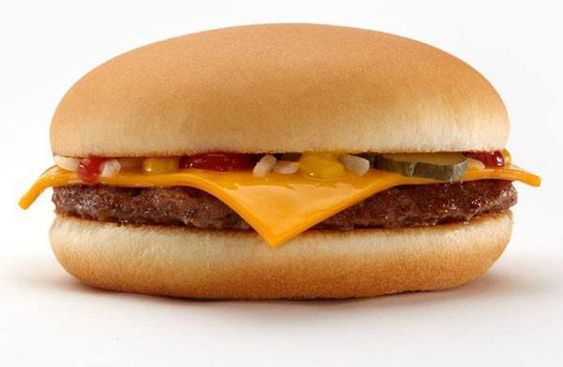A McDonald’s cheeseburger typically contains around 300 calories. However, the exact calorie count may vary slightly depending on factors such as portion size and specific ingredients used in the preparation. It’s always a good idea to check the nutritional information provided by McDonald’s or other reliable sources for the most accurate details.
Macronutrient Breakdown
Beyond calories, it’s essential to examine the macronutrient composition of the cheeseburger. On average, a McDonald’s cheeseburger comprises:
- Fat: Around 12 grams
- Protein: Roughly 15 grams
- Carbohydrates: Approximately 33 grams. Read about How Many Calories in a Bag of Popcorn
What Constitutes a McDonald’s Cheeseburger?
A standard McDonald’s cheeseburger contains a beef patty weighing approximately 45 grams, a slice of processed cheese, pickles, onions, ketchup, mustard, and a regular bun. These ingredients come together to create a savory and satisfying meal option for many fast-food enthusiasts.

Nutritional Overview of a McDonald’s Cheeseburger
Calories in a McDonald’s Cheeseburger
On average, a McDonald’s cheeseburger contains around 300 calories. However, the exact calorie count may vary slightly depending on factors such as portion size and specific ingredients used in the preparation process.
Macronutrient Breakdown
In addition to calories, a typical McDonald’s cheeseburger provides essential macronutrients, including protein, carbohydrates, and fat. While the exact distribution may vary, a cheeseburger typically offers approximately 15 grams of protein, 30 grams of carbohydrates, and 12 grams of fat. Discover about How Many Calories in a Chicken Wingette
Factors Influencing Caloric Content
Ingredients and Portions
The calorie content of a McDonald’s cheeseburger can fluctuate based on variations in ingredients and portion sizes. For instance, adding extra cheese or condiments may increase the overall calorie count, while opting for a smaller portion size can help reduce caloric intake.
Preparation Methods
The method of preparation also plays a role in determining the calorie content of a McDonald’s cheeseburger. Grilling versus frying, for example, can affect the amount of fat absorbed during the cooking process, thereby impacting the final calorie count.
Understanding Calories and Nutrition Labels
Consumers are encouraged to read nutrition labels carefully to understand the caloric content and nutritional value of the foods they consume. By being mindful of portion sizes and ingredient choices, individuals can make informed decisions about their dietary habits. Learn about Calories for Spicy Tuna Roll
Comparing McDonald’s Cheeseburger to Other Fast Food Options
In comparison to other fast-food items, such as fried chicken sandwiches or double cheeseburgers, a standard McDonald’s cheeseburger generally offers a relatively moderate calorie count. However, it’s essential to consider overall dietary balance and lifestyle factors when making food choices.
Tips for Healthier Fast Food Choices
For those looking to make healthier choices while dining at fast-food restaurants, opting for grilled items, choosing smaller portion sizes, and incorporating more vegetables into meals can help reduce calorie intake and improve nutritional quality.
The Impact of Caloric Intake on Health
Monitoring caloric intake is a critical aspect of maintaining a healthy lifestyle. Consuming excessive calories over time can lead to weight gain and increase the risk of developing various health conditions, including obesity, diabetes, and heart disease.
Common Misconceptions About Calories in Fast Food
There are often misconceptions surrounding the nutritional content of fast food. While some may assume that all fast-food items are high in calories and unhealthy, many restaurants offer options that can fit into a balanced diet when consumed in moderation.
Strategies for Enjoying Fast Food Moderately
Enjoying fast food in moderation can be part of a balanced diet. By practicing portion control, making mindful choices, and balancing indulgences with healthier options, individuals can incorporate fast food into their lifestyle without compromising their health goals.
The Role of Exercise in Balancing Caloric Intake
Regular physical activity plays a crucial role in managing caloric intake and maintaining overall health. By incorporating exercise into their routine, individuals can offset the calories consumed from indulgent foods and promote weight management.

Addressing Concerns About Fast Food Addiction
While occasional indulgence in fast food is acceptable, some individuals may struggle with unhealthy eating habits and find themselves reliant on fast food for comfort or convenience. Seeking support from healthcare professionals and adopting healthier coping mechanisms can help address concerns about fast food addiction.
Exploring Alternatives to Fast Food
For those seeking alternatives to traditional fast food options, exploring homemade recipes, meal prep solutions, and healthier restaurant choices can provide satisfying alternatives while supporting overall well-being.
Conclusion
In conclusion, the calorie content of a McDonald’s cheeseburger can vary based on factors such as ingredients, portion sizes, and preparation methods. While enjoying fast food in moderation can be part of a balanced diet, it’s essential to make mindful choices and prioritize overall health and nutrition.
FAQs
- Are McDonald’s cheeseburgers healthy?
- McDonald’s cheeseburgers can be part of a balanced diet when consumed in moderation as part of an overall healthy lifestyle.
- How can I reduce the calorie content of a McDonald’s cheeseburger?
- Opting for smaller portion sizes, skipping high-calorie condiments, and choosing grilled over fried options can help reduce the calorie content of a McDonald’s cheeseburger.
- What are some healthier alternatives to fast food?
- Healthier alternatives to fast food include homemade meals, meal prep solutions, and healthier restaurant choices that prioritize fresh ingredients and balanced nutrition.
- Can I still enjoy fast food while trying to lose weight?
- Yes, incorporating fast food into your diet occasionally can be compatible with weight loss goals, provided that overall caloric intake is managed and balanced with regular exercise.
- How often should I eat fast food?
- It’s recommended to consume fast food sparingly and in moderation, as part of an overall balanced diet that prioritizes fresh, whole foods.

Hi I’m Julie. Meet the talented fashion designer with three years of industry experience— the creative force behind urbansoutfitter.com. As the author of this stylish haven, they bring a fresh and innovative perspective to the forefront of fashion discussions.

